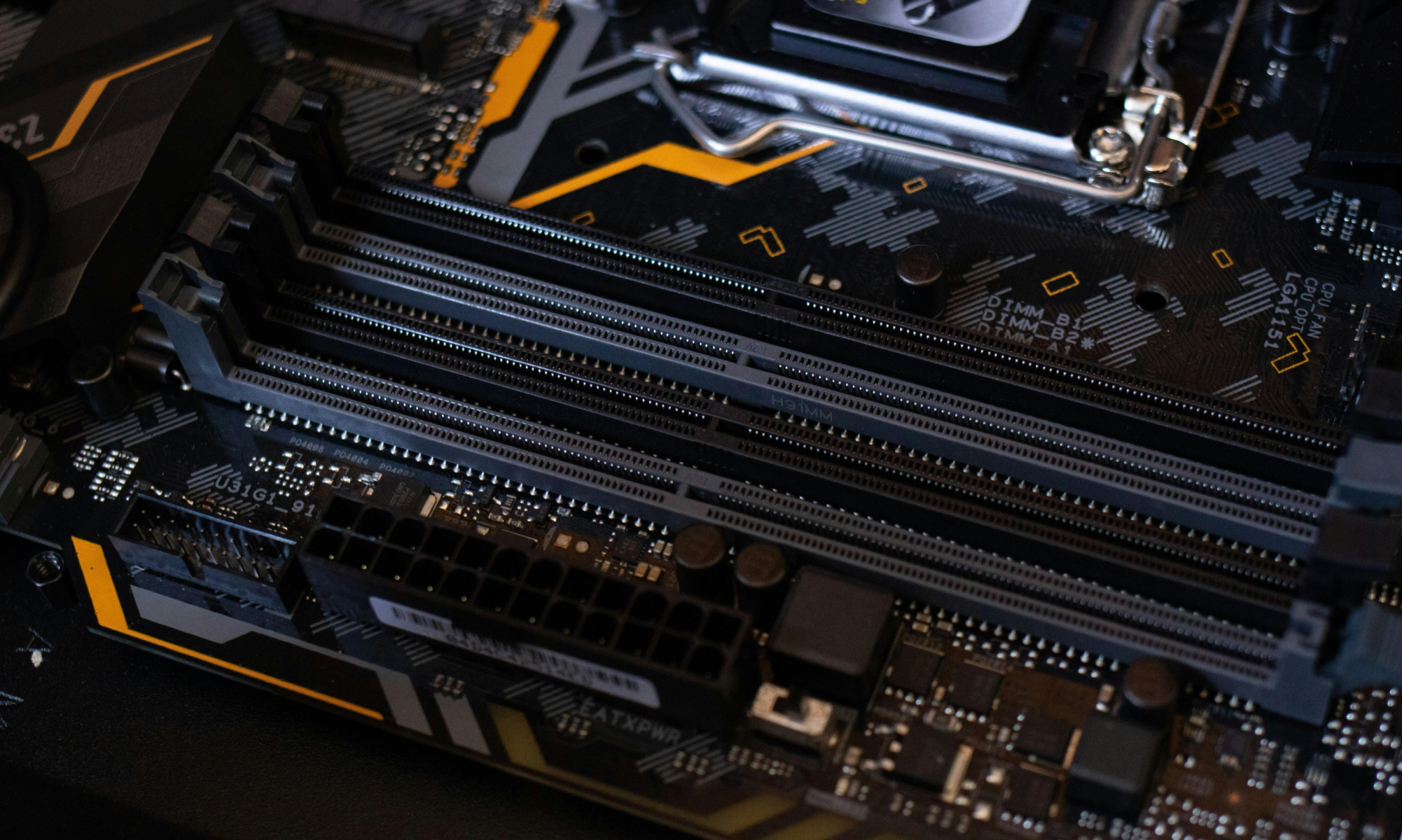AI
our blog
10 Ways AI Transforms Software Development for CTOs
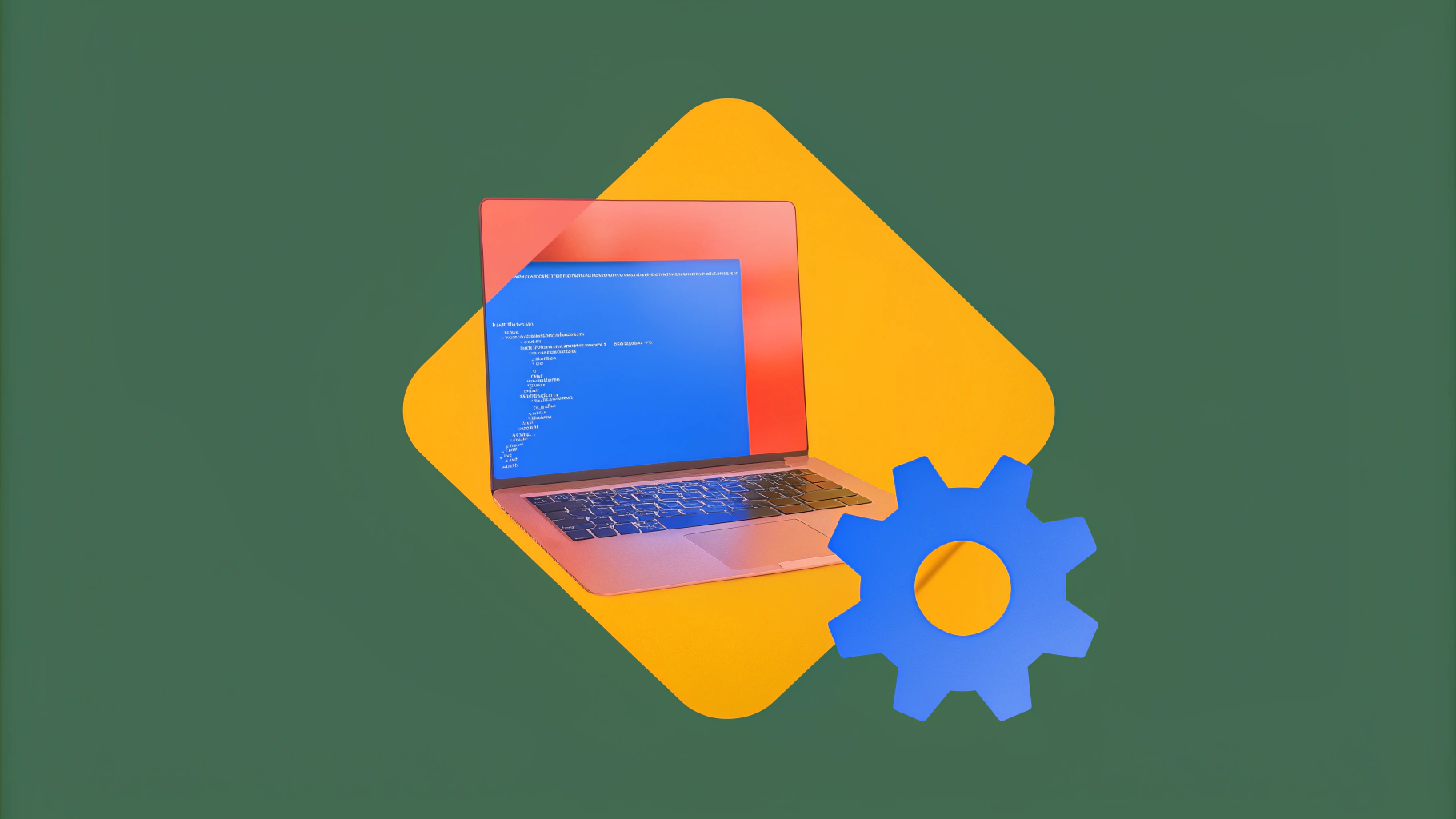
Overview
AI is revolutionizing software development for CTOs by automating various processes, significantly enhancing efficiency and improving code quality throughout the software development lifecycle. This transformation is multifaceted, as AI streamlines coding tasks, optimizes project management, and enhances user experience. Consequently, teams can redirect their focus towards innovation and strategic initiatives, rather than being bogged down by routine tasks. By leveraging AI, organizations can not only improve productivity but also foster a culture of creativity and forward-thinking.
Introduction
As the digital landscape evolves, the integration of artificial intelligence into software development is no longer merely a trend; it has become a fundamental necessity for organizations striving to maintain competitiveness. This article explores ten transformative ways AI is reshaping the software development process, particularly from the vantage point of Chief Technology Officers (CTOs). Readers will uncover how AI streamlines coding, enhances project management, and bolsters security, all while fostering innovation and efficiency within development teams.
However, as technology advances, what challenges and ethical considerations must CTOs confront to responsibly harness AI's full potential?
Studio Graphene: Revolutionizing Software Development with AI Solutions
Studio Graphene leads the charge in AI software development by integrating AI into application development, leveraging its expertise to craft innovative solutions that significantly enhance user engagement and operational efficiency. By offering comprehensive digital product creation services—encompassing Discovery, Design, and Build—the agency tailors its strategies in AI software development to address specific business challenges faced by both startups and established brands. This approach guarantees that each project not only meets technical specifications but also aligns seamlessly with broader business objectives.
With 83% of companies identifying AI software development as a top priority in their strategic initiatives, Studio Graphene emerges as a trusted ally for CTOs pursuing responsible innovation. This dedication is further highlighted by the fact that 88% of organizations report a positive impact on profitability from AI and automation efforts. Moreover, the agency's B Corp Certification underscores its commitment to social and environmental performance, positioning it as a pivotal player in the evolving landscape of AI software development, where efficiency and effectiveness are paramount.
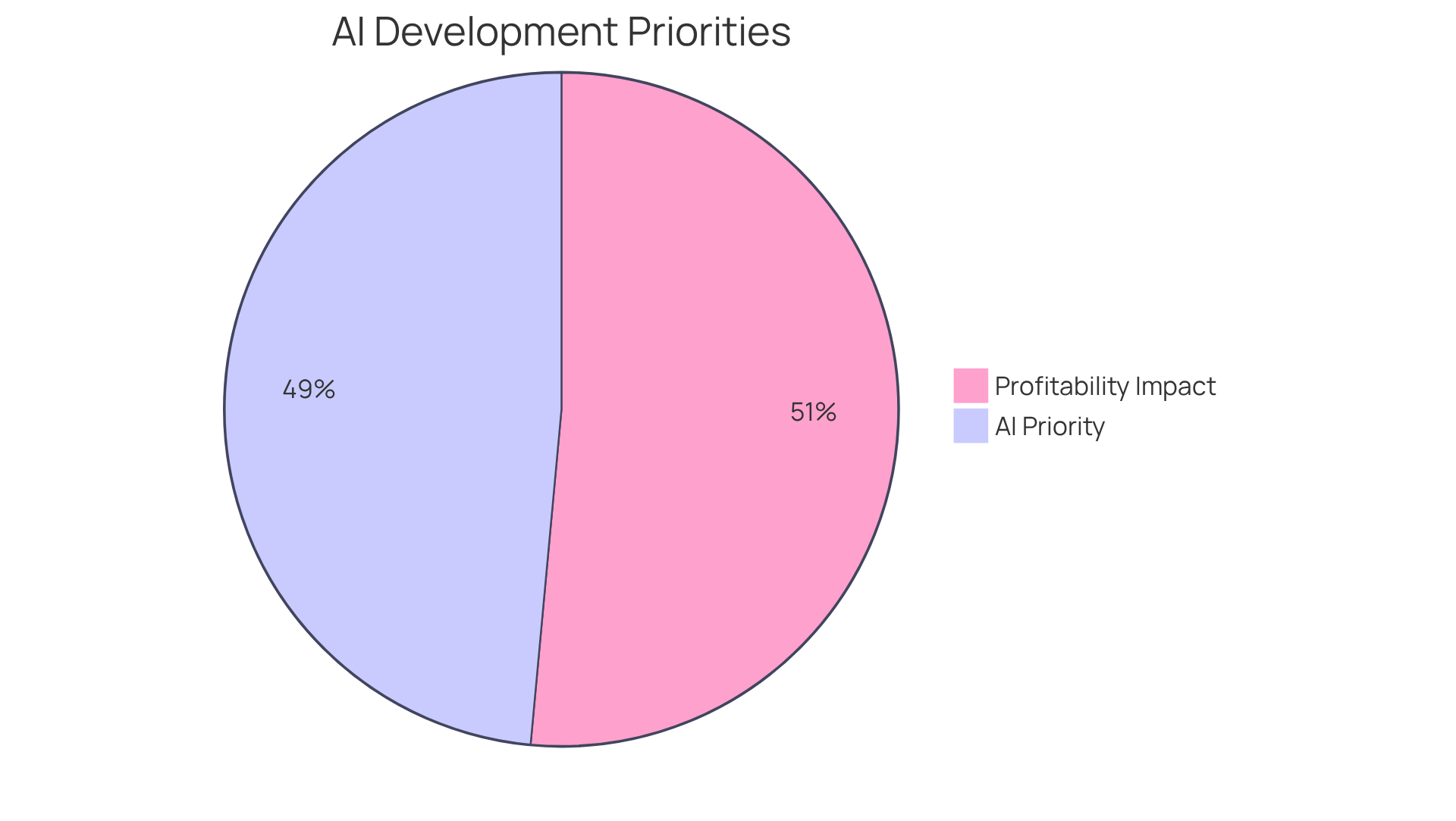
AI-Powered Code Generation: Streamlining Development Processes
AI software development resources are revolutionizing the development environment by automating repetitive programming tasks. These advanced tools analyze existing codebases and generate new code snippets based on natural language inputs or predefined templates. This automation not only accelerates the coding process but also reduces human error, enabling developers to focus on more complex and creative aspects of software design.
For instance, GitHub Copilot, utilized by 68% of developers, has been shown to significantly enhance coding efficiency. A study revealed that developers using generative AI resources could complete tasks up to twice as quickly, underscoring the potential of these tools to expedite project delivery without sacrificing quality.
However, it is crucial to recognize that 87% of respondents express concerns regarding the accuracy of AI agents, and 48% of AI-generated code contains security vulnerabilities, emphasizing the necessity for caution in production environments.
As AI software development continues to evolve, its integration into development workflows is anticipated to further streamline processes, empowering teams to achieve greater productivity and innovation while navigating the associated challenges.

AI-Driven Bug Detection: Enhancing Software Quality Assurance
AI-driven bug detection solutions harness machine learning algorithms to identify and categorize bugs more efficiently than traditional methods. By analyzing code patterns and historical data, these systems can predict potential vulnerabilities and recommend solutions before they escalate into significant issues. This proactive approach not only enhances software quality but also substantially reduces the time spent on manual testing.
For instance, tools like DeepCode and Snyk exemplify how AI solutions empower developers to maintain high standards of code quality throughout the software lifecycle. Recent studies indicate that AI software development can detect up to 30% more issues compared to conventional testing methods, underscoring its critical role in modern application development practices.
Moreover, AI software development, along with AI and ML, can mitigate the risk of defects in applications at launch, emphasizing their broader impact on quality assurance. It is crucial to recognize that while such testing tools are invaluable, as Daniel J. Galin aptly stated, 'Testing is not responsible for creating quality; only for evaluating it.'
Furthermore, ethical considerations in AI development must be prioritized to ensure the responsible application of these technologies in software testing.
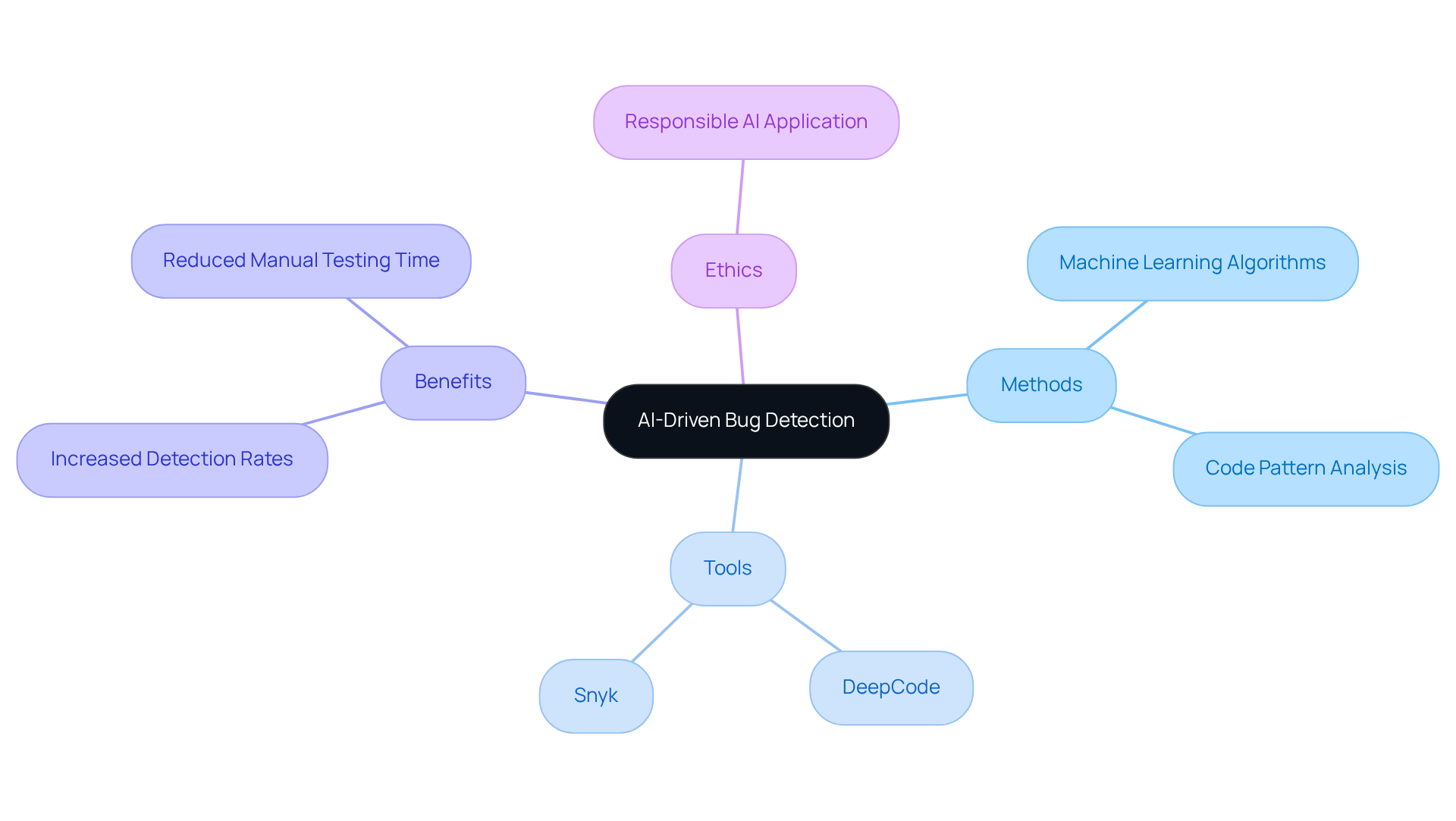
AI in Project Management: Optimizing Workflows and Resource Allocation
AI software development is revolutionizing project management by automating routine tasks, optimizing workflows, and enhancing resource allocation. This transformation addresses the challenge of inefficiencies in project management. By analyzing project data, AI systems can forecast timelines, pinpoint bottlenecks, and suggest modifications to keep projects on track.
For instance, platforms like Monday.com and Asana have integrated AI features that empower project managers to allocate resources more effectively and streamline communication among team members. This integration of AI software development has resulted in notable enhancements in efficiency, with 84% of participants reporting improved project outcomes after its adoption, as shown by recent survey data.
Furthermore, Gartner's research predicts that advancements in AI software development will enable AI to automate scheduling and reporting, eliminating 80% of busy work by 2030 and fundamentally changing the landscape of project management. Consequently, teams can concentrate on strategic initiatives rather than getting bogged down by administrative tasks.
Elizabeth Harrin emphasizes that 'AI is not just about automating tasks; it's about enhancing our capacity to manage projects more strategically,' highlighting the broader implications of AI integration.

AI-Enhanced Documentation: Improving Clarity and Communication
AI-enhanced documentation resources are revolutionizing the clarity and accessibility of project documentation. By automating the creation of technical documents and manuals, these resources ensure that information remains current and easily understandable. For instance, AI can analyze user feedback to refine documentation, tailoring it to better meet audience needs.
Furthermore, platforms like Notion and Confluence are incorporating AI capabilities to streamline the creation and maintenance of comprehensive documentation, fostering collaboration and knowledge sharing among teams. Notably, 79% of businesses have observed an improvement in content quality when utilizing AI resources, while 42% of small enterprises employing AI report substantial growth.
This integration not only enhances the quality of documentation but also significantly improves communication within organizations, ultimately driving efficiency and productivity. A case study on Notion illustrates how its AI capabilities have automated technical documentation processes, allowing teams to focus on higher-level tasks while ensuring that documentation is always up-to-date and relevant.

AI for Refactoring and Optimization: Maintaining Software Efficiency
AI software development resources for refactoring and optimization are pivotal in analyzing existing codebases to pinpoint inefficiencies and propose enhancements. These advanced tools can automatically reorganize code, boosting performance without compromising its original functionality—an essential factor for maintaining software efficiency and long-term sustainability.
For instance, CodeGuru and Refactor.ai equip developers with actionable insights that not only optimize their code but also significantly diminish technical debt. Notably, 41% of business owners expect AI to aid in efficiently rectifying coding errors, underscoring the importance of these resources in fostering a culture of code reuse and optimization.
Furthermore, developers can save 30-60% of their time on coding, testing, and documentation when utilizing AI software development, showcasing the efficiency gains achievable. By harnessing AI for refactoring, companies can ensure their systems remain agile and responsive to the ever-evolving demands of the business landscape.
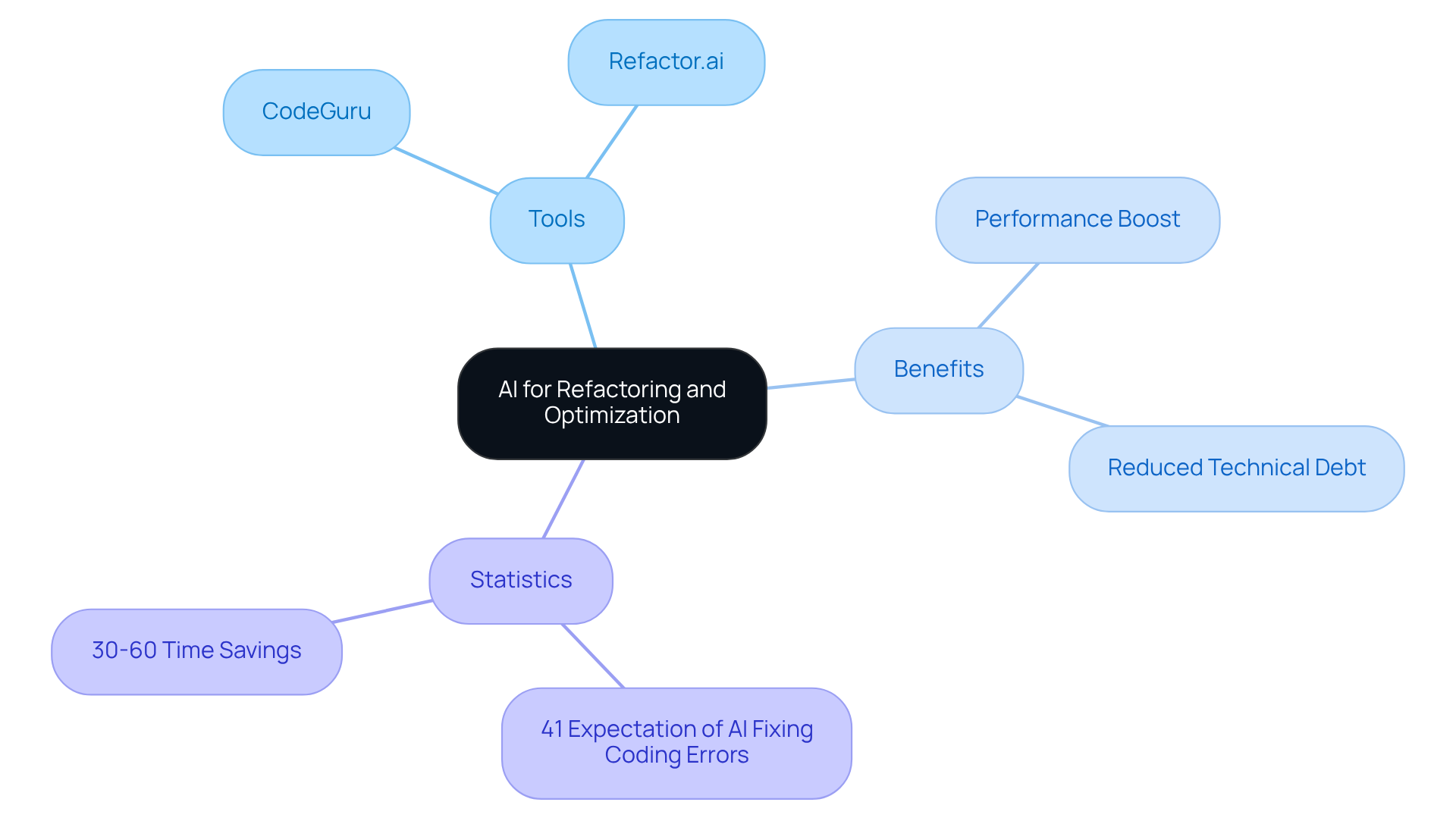
AI-Driven Security Enhancements: Protecting Software Integrity
AI-driven security improvements are essential for safeguarding system integrity in today's digital landscape. By leveraging machine learning algorithms, these sophisticated tools effectively detect anomalies, identify potential threats, and respond to security incidents in real-time. This proactive approach not only mitigates risks but also bolsters user confidence, ensuring that the system remains secure throughout its lifecycle.
With machine learning-based phishing detection achieving an impressive accuracy rate of 98%, organizations adopting these technologies are better equipped to navigate the complexities of modern security challenges. Furthermore, the global AI cybersecurity market is projected to grow at a compound annual growth rate of 21.9%, underscoring the increasing significance of AI in security strategies.
CTOs should seriously consider implementing adversarial machine learning (AML) procedures as part of their AI security strategy to enhance defenses against evolving threats.
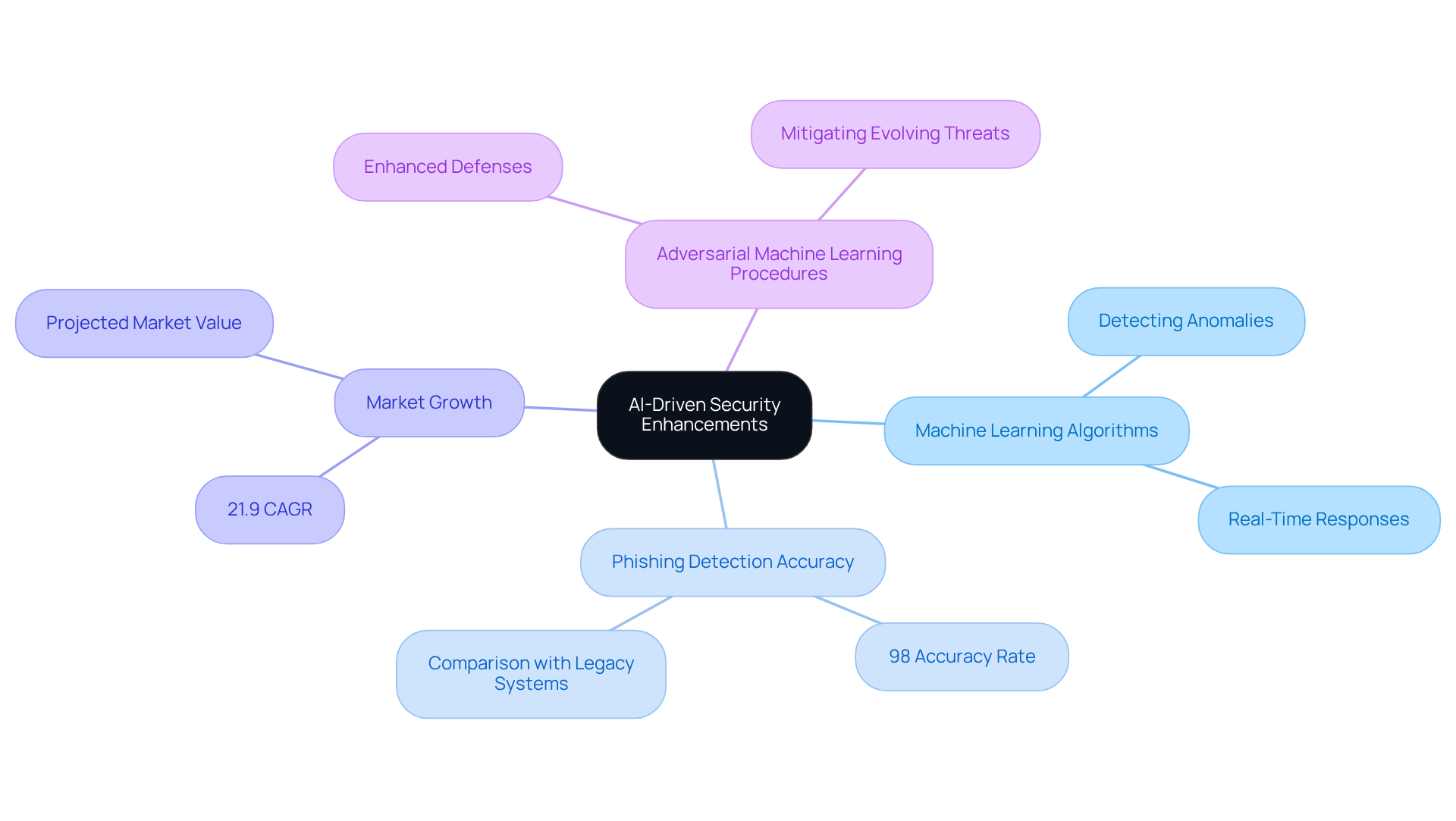
AI in DevOps: Automating CI/CD Pipelines for Faster Delivery
AI software development is fundamentally transforming DevOps by automating Continuous Integration and Continuous Delivery (CI/CD) pipelines, resulting in significantly faster and more dependable releases of applications. By utilizing AI resources, organizations can examine historical data to enhance build processes, automate testing, and foresee deployment challenges before they arise. This proactive approach not only accelerates software delivery but also fosters enhanced collaboration between development and operations teams. Notably, platforms like Jenkins and GitLab CI are increasingly integrating AI features, streamlining workflows and boosting overall efficiency. As Sundar Pichai observes, AI improves human capabilities, framing it as a collaborative resource that boosts productivity.
Furthermore, the cultural change required for successful DevOps adoption cannot be overlooked; organizations must embrace a mindset shift alongside tool integration. Studies indicate that the influence of AI software development on software delivery speed is comparable to the impact of electricity on industry transformation, underscoring its significance. However, as Satya Nadella highlights, ethical considerations in AI creation are vital to ensure technology serves the greater good. To implement AI-enhanced CI/CD solutions effectively, CTOs should prioritize building trust and transparency within their teams, fostering an environment conducive to innovation and collaboration.
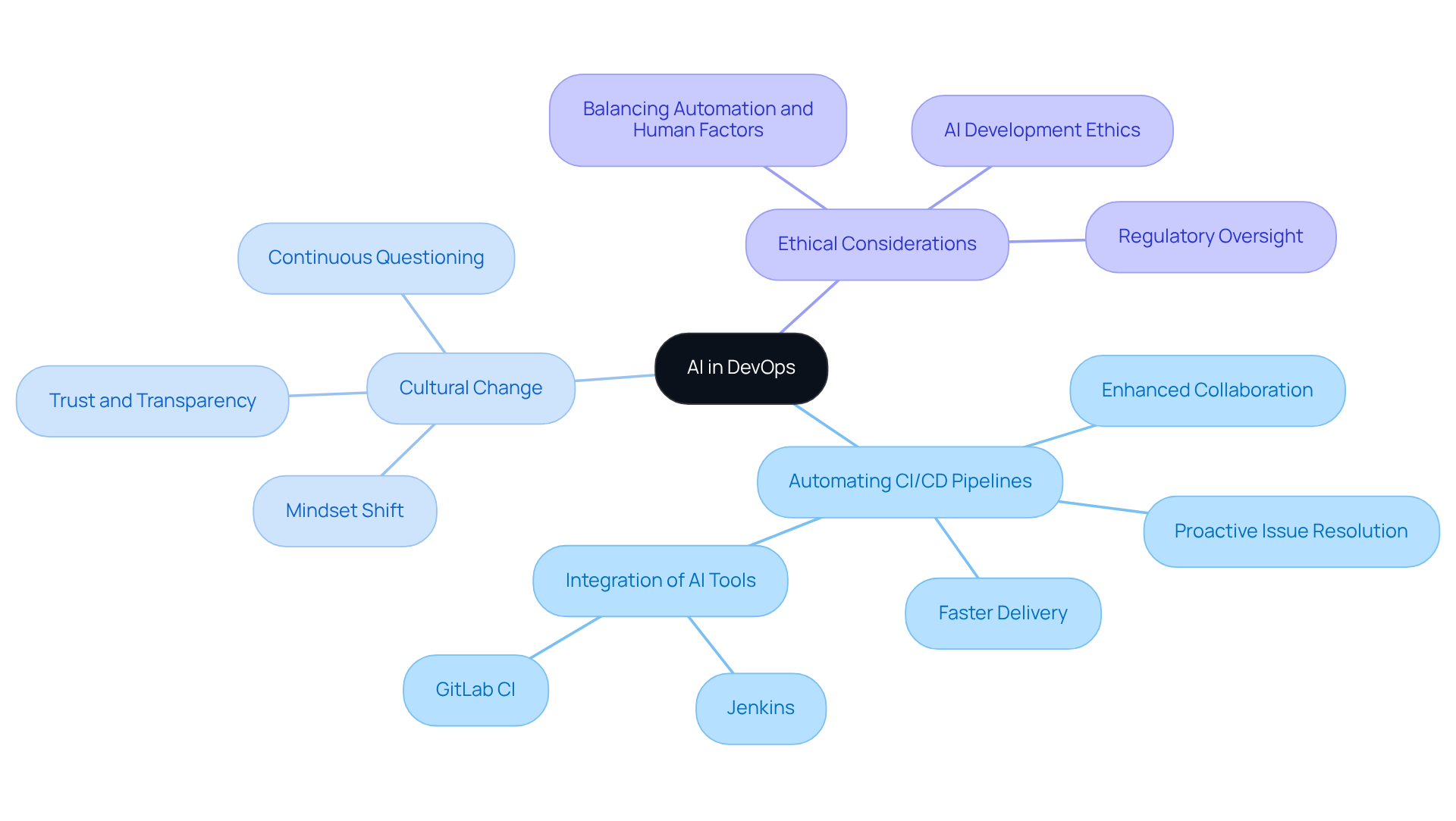
AI in UX Design: Creating Personalized and Intuitive Interfaces
AI is revolutionizing UX design by facilitating the development of customized and intuitive interfaces that adapt to individual preferences and behaviors. By leveraging client data, AI tools can recommend design elements that significantly enhance usability and engagement.
For instance, platforms such as Adobe XD and Figma are incorporating advanced AI features, empowering designers to create client-centric interfaces that dynamically respond to user interactions. This emphasis on personalization not only boosts user satisfaction but is also linked to increased conversion rates; well-crafted interfaces have the potential to elevate conversions by as much as 200%.
A robust UX strategy can amplify this figure even further, potentially driving conversions up to 400%. Furthermore, AI software development utilizing AI-driven personalization can enhance engagement by up to 80%, underscoring the pivotal role these technologies play in modern application development.
It is also critical to acknowledge that 94% of first impressions are design-based, underscoring the importance of aesthetics in fostering user engagement and satisfaction.

AI's Transformative Impact on the Software Development Lifecycle (SDLC)
The incorporation of AI software development into the Development Lifecycle (SDLC) is fundamentally transforming the creation, testing, and maintenance of applications. By automating various stages of the SDLC, AI enhances efficiency, reduces errors, and accelerates time-to-market. Currently, over 75% of businesses are expected to integrate AI software development into their main operations by 2025, indicating a significant trend toward automation. This shift enables teams to focus on innovation rather than routine tasks. For instance, AI-powered tools are projected to account for 75% of all customer service interactions by 2025, illustrating how AI streamlines processes from requirements gathering to deployment and maintenance.
Furthermore, AI's impact on code quality is remarkable, with improvements of up to 35% reported across various projects. This aligns with the statistic highlighting a 35% enhancement in code quality due to AI integration. Such advancements not only expedite time-to-market but also foster a culture of continuous learning and adaptation within project teams. As organizations embrace AI technologies, the future of application development is poised for increased agility, enhanced collaboration, and a focus on delivering high-quality products that meet evolving market demands. Experts assert that AI software development is not merely a tool but a catalyst for transforming development, testing, and maintenance, ultimately reshaping the industry's landscape.
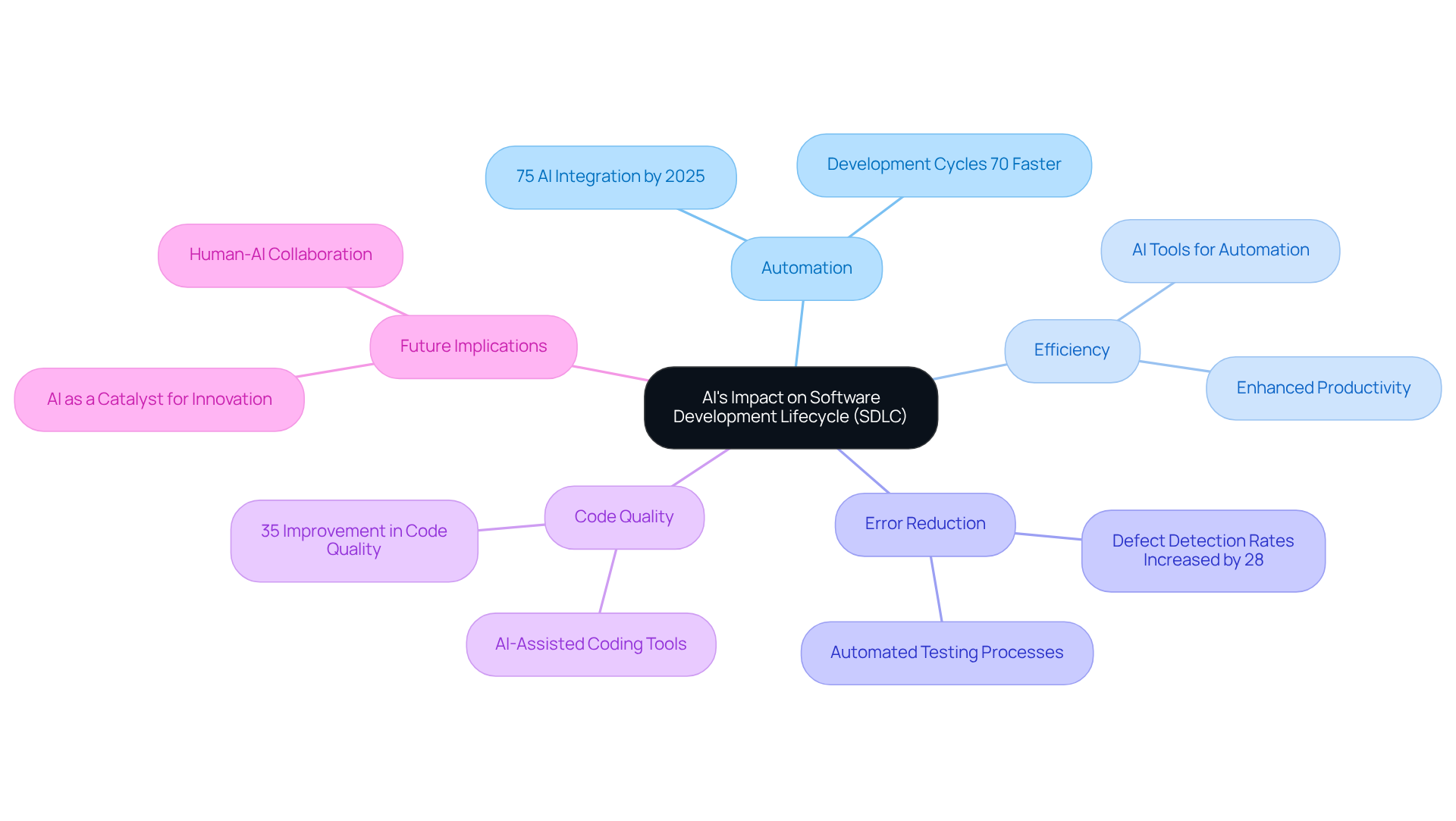
Conclusion
The integration of AI into software development is not merely a trend; it signifies a profound transformation reshaping how applications are created, tested, and maintained. By leveraging advanced technologies, organizations can enhance operational efficiency, improve code quality, and accelerate project delivery, ultimately aligning software development practices with broader business objectives.
Throughout this article, we have highlighted key innovations in AI software development, including:
- AI-powered code generation
- Bug detection
- Project management
- Security enhancements
These advancements streamline processes and empower teams to focus on strategic initiatives rather than routine tasks. The statistics presented, such as significant improvements in coding efficiency and the ability to detect more bugs, underscore the tangible benefits that AI brings to the software development lifecycle.
As the industry continues to evolve, embracing AI solutions will be crucial for CTOs and organizations aiming to maintain a competitive edge. The proactive application of AI technologies can lead to remarkable gains in productivity, quality, and user satisfaction. Therefore, it is imperative for leaders in software development to prioritize the adoption of AI tools and practices, ensuring their teams are equipped to navigate the complexities of modern application development while fostering a culture of innovation and continuous improvement.




